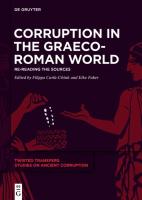
de Gruyter (2025) h/b 362pp £91 (ISBN 9783111338606)
Charges of corruption are as old as the first organised societies. Democracies, oligarchies and autocracies – all are vulnerable. Free tickets to Taylor Swift concerts, one-off bribes to ministers for oil concessions or armaments contracts, closed business circles around dictators: all raise issues of moral behaviour for personal advantage.
In the Roman world there was plenty of corruption, and certainly enough of it for politicians to accuse each other of it. These very detailed essays examine how corruption became a very common political charge as the Republic gained provinces to plunder. Verres, governing Sicily, allegedly set himself the target of three years’ worth of embezzlement: the first for his own enrichment, the second to pay his lawyers for the ensuing trials, and the third to bribe the juries involved.
We learn, mainly from Cicero, how charge and counter charge became key political weapons as candidates ascended the cursus honorum. Later, under the emperors, ‘gifting’ or bribery had additional purposes: rewarding the loyalty of veterans or as practical diplomacy in securing peace with aggressive neighbours.
The various authors, in this joint study from Roehampton, Durham and Potsdam Universities, go back to the sources and dig deep into the linguistics (testing one’s understanding of ‘contextual polysemy’ and ‘multivalent exemplarity’). What do we mean by corruption or what they term ‘twisted transfers’? Here it’s described as the abuse of entrusted power for private gain, and could be both active or passive.
Either way it was seen as a force of moral degradation, and a symptom of what was seen as an irreversible decline from the golden age of the Republic’s forefathers. What had changed, of course, was the extraordinary wealth that the rapidly expanding Republic was acquiring, first from across Italy and then from each new province. Public service as duty became office-holding for personal enrichment. Orators like Cicero deplored the rotting away of constitutional and behavioural norms as elections were rigged and judges and juries were bribed.
There are thirteen essays here on different aspects of corruption. We learn, for example, of corruption in the acquisition of Roman citizenship by upwardly mobile Latins; corruption in Roman-run Egypt which certainly predated the Roman arrival; and corruption in the imperial ports as officials deployed sampling and tasting to check volumes and compliance.
The study’s compass of corruption is also stretched to include what we might now call ‘development aid’: the gifting by successive emperors of large sums to neighbouring rulers to alleviate pressures on Rome’s eastern frontiers or incentivise them to attack troublesome rivals. As in corruption at home, the status of the donee mattered as much as that of the donor. Foreign recipients, too, were concerned with how these payments were presented: they usually preferred regular, even lower, annual payments to larger one-off lump sums.
Corruption was equally rife in private life, notably in inheritance where testators hovered around dying potential benefactors (‘like vultures waiting for carrion’ wrote Seneca). Various laws under the Republic and Principate attempted unsuccessfully to regulate these practices which the authors see as facilitating ‘asymmetric transfers’ (and avoiding taxes into the bargain).
This is an interesting collection of essays which comes with a sociological wrapping about the concept of discourse in textual analysis which some readers less familiar with the doctrines of Foucault and Habermas may find challenging.
Sir Michael Fallon
Founder of the original Parliamentary Classics Group
